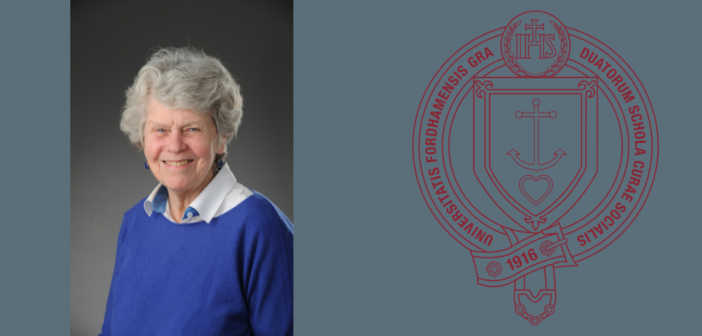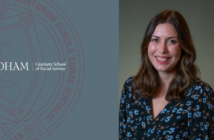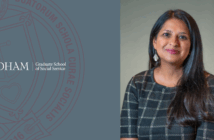Support systems inspired Dr. Sandra Turner to be great.
When Sandra Turner, Ph.D., was growing up, she gained leadership skills through sports. An avid tennis, basketball, and field hockey player, Turner excelled on the field — but more importantly, she had mentors who supported her. This was a rare phenomenon, she said, for the time — back in the 50s and 60s, when women’s sports were in the shadows of their male counterparts.
“That’s probably what helped me the most when I was growing up, being on a sports team,” she said. “I had a lot of coaches who were very supportive of me, and always told me to go for it. That really helped. I felt I could achieve things.”
This empowerment at a young age set the tone for Turner’s storied career as a feminist, faculty member, leader, and role model for many. And as of July 1, 2023, she announces her retirement from Fordham GSS after 33 years.
“I’m already going to miss Fordham and teaching,” she said. “But the timing is right, having just had a new grandson. So I get a lot of time to be able to be with him, and help my daughter and her partner. And so in that sense, it’s a good timing.”
We sat down with Turner to speak about her incredible career, insights into the profession, and many achievements.
A Publisher’s Eye
Though Turner has dedicated the last 40+ years to social work, like many in the profession, she came from a different career path. Before social work, Turner had completed her bachelor’s degree in English and landed her first job in the publishing industry. And although her stint in professional publishing was short-lived, she serendipitously got to work on a project that would later be known as one of the greatest novels of all time, Toni Morrison’s The Bluest Eye.
“I was the project editor,” Turner said. “That was quite an experience. I met her a couple of times, and I have just always been such a fan of hers.”
Turner would spend the next five years in the industry before realizing her true calling was social work. An interest in psychotherapy led Turner to apply to Fordham’s Master of Social Work (MSW) program. She enrolled in 1973, ready to take on a new challenge.
“I was excited to be back in school again,” she said. “I felt like, ‘this is such a worthwhile profession that I’ve chosen.’ [In my previous job], I was always working on other people’s stuff. In social work, I felt like I was doing my own things and writing my own articles — that was exciting.”
Once she was in the program, however, Turner deviated from her clinical motivations. As she learned more about the macro side of the profession, she gravitated toward communities and policy.
“My horizons expanded,” she said.
That mindset shift is common in today’s world, she said. More social work students are falling in love with community- and policy-based work, and the result, Turner said, is a decreased divide between “clinical” and “macro” social workers. Which is a good thing, she continued, since all social workers should have a skillset for both.
“It’s not so totally divided between people who are clinicians and people who do community and policy work,” she said. “We need to be both. We need to have good clinical skills, and we also need to be out there in the community and be advocates and do that work as well. Unlike other professions, we really have the ability to serve people in both ways.”
Teaching Her Passions to Others
After graduating from GSS and working for 15 years at St. Vincent’s Hospital in Greenwich Village — first as a director of its community outreach, and then its outpatient program — Turner returned to school again. She wanted to teach upcoming social workers about the profession she loved, so she obtained her doctorate in social work from Rutgers University. In 1990, she returned to Fordham GSS as a faculty member, ready to inspire others, as her sports coaches had inspired her growing up.
“The Jesuit tradition makes Fordham stand out amongst other schools, and the location is obviously a draw,” she said. “I think the Jesuit values are really critical.”
Turner made a splash immediately. In her first year at Fordham, she served as co-director of a five-year, $2 million grant to identify practice principles in the prevention of adolescent substance abuse. Throughout her tenure, she also served as chair of the Foundation area from 1998-2004 and Academic Associate Dean from 2004-2014.
“I’ve worked with many wonderful faculty and administrators in my GSS career,” Turner said. “Our two most recent deans, Peter Vaughan and Debra McPhee, have led the school with tremendous vision. I feel privileged to have worked with them.”
Bringing Representation and Exploration to GSS
Turner was instrumental in developing the Institute for Women and Girls, the Mentoring Latinas Program, and the London Summer Program at GSS.
The Institute for Women and Girls stemmed from a faculty lunch in June 2001, Turner said. All those at the table identified as feminists but realized GSS had no dedicated organizations for such beliefs. So, they decided to form one.
“We wanted to start an institute that had a focus on women and girls — feminist issues, equality issues, and diversity issues,” she said. “We met and put on conferences. Elaine Congress was also a founding member, and, through her connection with the United Nations, partnered with the Commission on the status of women and the conference they hold every year.”
“Since the time we both started at Fordham, Sandy has been an ongoing advocate for women’s rights,” Congress said. “Over the years I and others in the Fordham Institute of Women and Girls have always welcomed both positive news as well as challenges she has shared in our ongoing work to promote gender equality and equity for all.”
The Institute quickly formed global partnerships, particularly one with the International Health Awareness Network (IHAN) and its founding president Sorosh Roshan, M.D. That relationship has continued with current IHAN president Gabrielle Casper, M.D. The two groups held a virtual webinar for Women’s History Month this past March. Additionally, since its formation, the Institute for Women and Girls has had faculty members who obtained Fulbright Scholarships and multiple grants, and sent a group to South Africa, among its many conferences.
Turner has helped co-direct GSS’s Mentoring Latinas Program (which falls under the Institute for Women and Girls) since 2004. Within this program, Fordham undergraduate students who identify as Latina mentor young Latina girls growing up in the Bronx.
“In the last three years, all of the mentees have gotten into college, which is amazing,” she said. “And it has really helped the mentors with their leadership skills. Many have gone on to apply for graduate school.”
Turner knows the value of a good mentor. She’s had them, and she’s been one. A good mentor can change your life.
“That’s one of the things I feel really most proud of,” she said.
Forty Years of Feminism
Turner is also on the corporate board of Affilia, an academic journal that serves as a “dedicated space for feminist voices, underrepresented in mainstream social work journals, and the topical and methodological challenges that these marginalized voices raised for the field and the discipline.”
“Affilia was actually started by Fordham faculty many years ago,” she said. “It’s been really exciting to be involved with a feminist journal.”
So, in her own words, what does it mean to be a feminist?
“I think it means striving for women’s rights, equality, respect, and opportunities,” she said. “And supporting other women.”
And while things like the gender wage gap cause many to question the priorities of modern society, there are glimmers of hope. Fordham University’s appointment of President Tania Tetlow is one of those glimmers.
“She seems very committed [to Fordham], and I find her very exciting,” Turner said.
Continuing as a Mentor
Although Turner’s retirement officially begins this summer, that doesn’t mean she’ll stop inspiring others to reach their potential. For one, she plans to stick around at GSS, keeping an eye on the Institute for Women and Girls and the Mentoring Latinas Program. She will also no doubt show the love and support to her grandson which will cause him to achieve great things.
When asked for advice she’d give her former self, I got to see the mentor Turner is. The words apply to anyone, in any situation — on the field, in the classroom, or in the agency.
“Go for it. Do everything you can,” she said. “Think highly of yourself. Realize the importance of the work you’re doing.”



